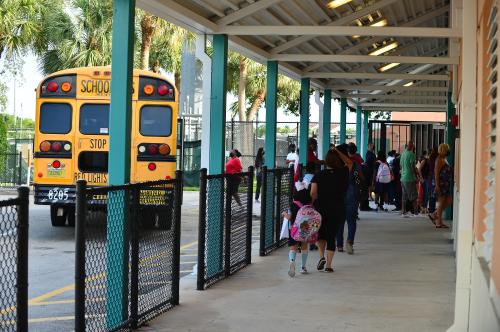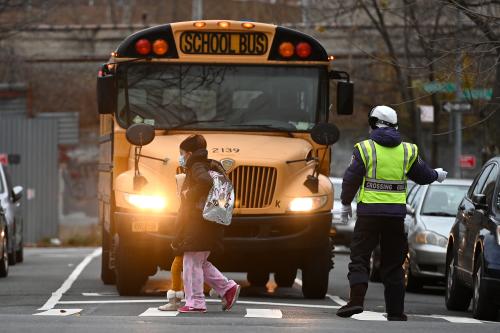Every morning, K-12 students across the country wake up and prepare for another day of school. While students’ morning routines may look similar everywhere—eating breakfast, getting dressed, scrambling to finish homework assignments—the time school starts varies considerably across schools. This seemingly simple start time decision can have meaningful effects on students’ sleep, health, engagement with school, and learning.
Over the last two decades, sleep research has convincingly shown that around the onset of puberty many adolescents experience biological changes that impact the timing of their sleep. Adolescents still need approximately nine hours of sleep each night, but it becomes difficult for them to fall asleep before 11:00pm and wake before 8:00am. Early school start times make it challenging for adolescents to get the sleep they need, and fatigued students may be less engaged with and successful in school.
In response to this evidence, many school districts across the country have delayed start times for their high schools. This decision is supported by sleep research and multiple studies showing that later high school start times are associated with improved attendance, course grades, behavior, and achievement.
While later start times benefit high school students, we also need to consider the indirect effects on younger students. Districts often stagger start times for elementary, middle, and high schools to allow for multiple busing runs, lessen traffic congestion, and allow caregivers to drop off children at different schools. If high schools are starting later, it likely means that elementary and/or middle schools must start earlier.
Is this a good tradeoff? Do these earlier elementary and middle school start times come at a cost to the sleep and academic outcomes of younger students? And are there better and worse ways to organize school schedules? Over the last five years, we have sought to answer these questions through a series of studies on school start times in North Carolina.
Why Do School Start Times Matter for Student Academic Outcomes?
In prior work, we put forth a theoretical model for how start times influence academic outcomes. Later school start times allow for additional sleep, which should benefit students’ alertness, attention, and memory. An increase in sleep and cognitive functioning should improve more proximate academic outcomes such as attendance, behavior, and course grades. More distally, we would expect benefits for student achievement.
Yet, studying the effects of varying school start times can be challenging. Comparing academic outcomes across schools with different start times may conflate start time effects with other characteristics of schools and districts. A more rigorous approach is to assess how changes in school start times predict changes in academic outcomes. However, schools rarely change start times, and even when schools do change start times, there are questions regarding the generalizability of those effects to other schools.
To date, there have been only a few studies on start times and academic outcomes for elementary and middle school students. At the elementary school level, prior studies do not convincingly isolate start time effects or analyze actual changes in start times. At the middle school level, a study from one district shows that shifts to later start times predict higher test scores, especially for low-performing students.
New research from North Carolina
We add to this existing research with a series of start time studies in North Carolina. This includes analyses of an urban district that shifted many elementary school start times from 9:00am to 7:45am or 8:30am, as well as statewide analyses of start times in elementary and middle schools. Our work uses eight years of administrative data and considers a broad set of outcomes—sleep, attendance, suspensions, course grades, and test scores—for all students and certain subgroups. Notably, we focus on schools that make changes to their start times rather than relying on variation in start times between schools. In combination, our studies provide the richest evidence yet regarding the connections between start times and academic outcomes for younger students.
Finding 1: Earlier start times have small, mixed effects on elementary school students
In partnership with an urban district in North Carolina, we surveyed 5th graders, districtwide, about their sleep and perceptions of their start time. Compared to peers attending elementary schools starting at 9:00am, those attending elementary schools starting at 7:45am reported getting 45 minutes less sleep per night. In addition, those starting at 7:45am were approximately half as likely—40% to 74%—to agree that their school started at the right time. These findings are consistent with prior work showing a strong relationship between school start times and sleep.
While later start times predict more sleep for elementary school students, results for academic outcomes are modest and mixed. We find that student absences increased slightly after elementary schools switched to an earlier start time (with some evidence of larger increases for white students and those living in rural areas). Conversely, we find that earlier elementary school start times predict modestly higher math scores, especially for economically disadvantaged students and students of color. In our analysis, start times do not appear to affect elementary school reading scores or suspension rates.
Finding 2: Earlier start times negatively affect middle school students
Earlier start times have more consistent and substantially negative effects for middle schoolers. We find that student absences increase after middle schools switch to an earlier start time. These results are particularly large for economically disadvantaged students and suggest that it may be difficult for some students and families to adjust to an earlier commute. Middle school students—especially middle school boys—are also less likely to be suspended after their school switches to a later start time. For instance, after a one-hour delay in start time, middle school boys are 2.5 percentage points less likely to ever be suspended during the year. Start times do not predict course grades for middle school students.
We find robust evidence linking later start times to increased test scores for middle school students. A one-hour delay in middle school start times predicts math scores 8% of a standard deviation higher and reading scores 4% of a standard deviation higher. To put these results into perspective, these estimates are larger in magnitude than the average effectiveness differences between first- and second-year teachers.
Implications for Start Time Decisions
Our findings highlight several important takeaways for state and local education officials. Like prior work in high school, our findings show that later start times benefit the academic outcomes of middle school students. Meanwhile, we find that earlier start times for elementary school students have modest and mixed effects—i.e. a small increase in absences but also a small increase in math test scores. These findings are consistent with the biology behind adolescent sleep. That is, changes in sleep patterns occur around the onset of puberty, which is generally when adolescents are in middle school or near the end of elementary school.
Taken together, our results indicate that districts should prioritize later start times for high schools and middle schools. Evidence indicates that elementary schools can start earlier to accommodate these shifts without negatively affecting student outcomes.
More broadly, we believe our results emphasize the connections between adolescent health and educational outcomes. Initiatives to improve student health—e.g., later start times, free school meals, and school-based health clinics—can be effective approaches to improve student engagement and achievement. This is particularly important in the aftermath of the COVID-19 pandemic as districts and schools work to promote student social-emotional and learning recovery.







Commentary
What new research tells us about elementary and middle school start times
March 23, 2023